 Written by ContentPowered.com
Written by ContentPowered.com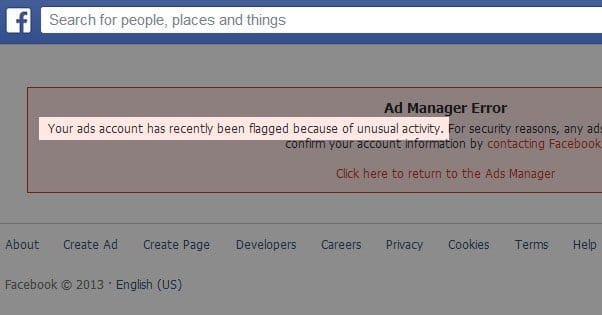
Facebook has a comprehensively labyrinthine set of rules for their ads, and they can often be inconsistent with their enforcement. If you need any proof of that, all you need to do is look up the history of the 20% text rule for ads. On the other hand, once they ban you, they’re very good at keeping track of you and making sure any future accounts you try to make to circumvent a ban are also banned. It’s a bad situation, and the unclear nature of their ban reasons doesn’t help anything.
Sometimes you’ll find your ads access revoked due to unspecified “unusual activity,” and you’ll have to struggle to figure out what that unusual activity is. They provide a contact email, but they’re seldom any help through it, and with good reason; they are probably flooded with messages every day with more volume than they can handle. When every issue needs to be investigated, it takes time to work through tickets; time you don’t have.
So, what sorts of issues might have caused your unusual activity warning, and what can you do to fix them? Here are the most common ideas.
Difference Between Account and Billing Name
This one trips up a lot of people. When you run an ads account, even if you’re running it from a page, you’re running it from a page linked to a personal profile. That’s simply how pages work. Even if you’re running it through their business manager as part of a team, somewhere there’s a name on file as the person responsible for the page.
The issue people encounter is when the name on their billing is different from the name that’s attached to the page and ads account. It’s perfectly legitimate for that to happen. You might be using a spouse’s card, a PayPal with a different variation of your name, or heck, maybe you got married and changed your page name but it hasn’t percolated through all of your financials yet.
The trouble is, as far as Facebook is concerned, there’s no way to tell the difference between you using financials you’re authorized to use and you using a stolen credit card. They don’t want to have to deal with chargebacks and financial fraud, because it’s very costly, both in terms of the fees they have to pay and the time involved.
Sure, there are some legitimate reasons for a name disconnect, but at the end of the day, it’s simply easier and cheaper for Facebook to preemptively restrict people with that inconsistency than it is to filter them and deal with the issues that arise when a problem comes up.
Similarities to Other Banned Ads
This is the second most common reason. If you’ve ever had an ad denied, it’s entirely possible that everything about that ad has been added to the system as a red flag. If you immediately try to make another ad using similar content, it can be flagged as well. This includes slight variations on copy, the same image, or the same landing page. Trying to re-use something Facebook flagged is liable to get your entire account flagged, and that leads to further problems.
Any time an ad violates guidelines and is denied or removed, Facebook is teaching you something. Avoid repeating the same mistake twice and you’ll be much better off. You don’t want to end up publicly called out in Facebook’s help section, after all.
Issues with Payments, Past or Present
As mentioned, Facebook takes financial issues very seriously. Any time you try to use a payment method and have it declined, it screws up Facebook’s billing process, and they take a scorched earth policy for that.
Here are the acceptable forms of payment:
- You can only make payments using one of the acceptable currencies on this list.
- You can use Visa, MasterCard, American Express, or Discover cards, but only in credit mode; debit cards only work if they can run as credit.
- You can use prepaid currency using one of these methods. PayPal also works.
You aren’t hugely restricted, but some common forms of money transfer used by scammers are banned. Additionally, you will be banned with no recourse if you use a credit card that is reported stolen.
Violations of Ad Policy Guidelines
Facebook has a lot of different guidelines, and they can be quite complex. They also aren’t a complete ban on certain pages; if your page is against the guidelines, you can still advertise.
Here’s a quick rundown of what guidelines restrict, and how you have to comply with them. If you find yourself violating one of them, back off and wait a while before trying to add a new ad; you don’t want legitimate ads flagged in collateral damage.
- You are not allowed to use text that takes up more than 20% of the image according to Facebook’s grid tool. Note that this tool is very fickle with what it considers a box with text in it, and it can be as easy as a minor shift in positioning to get it right.
- You are not allowed to use the Facebook logo, use the word as a verb, pluralize it, alter the logo, or otherwise obscure or accentuate their branding.
- You are not allowed to advertise restricted content types, like cigarettes, alcohol, firearms, or adult services to an audience that includes anyone under the legal age to be viewing and consuming such products and materials. Facebook makes this easy to enforce so long as you categorize your page properly, so avoid miscategorizations.
- You are not allowed to promote anything illegal, which includes prescription medications, illegal drugs, paraphernalia, weapons, ammo, explosives, or adult products with the exception of some supplements as determined by Facebook, and family planning and contraception services or products.
- You are not allowed to advertise using a trademark, copyright, or private information you do not have control over.
- You are not allowed to use copy or images that are sexually suggestive, risqué, provocative, explicit, or outright voyeuristic. Even art from centuries ago that features nudity has been known to be banned.
- You are not allowed to use imagery that is scary, gory, shocking, or otherwise intended to frighten or repulse users. This includes surgical procedures, needles, guns pointed towards users, disfigured people, organs, profanity, animal abuse, injuries, violence, car crashes, dead bodies, or – and this is an unusual one – ghosts, zombies, ghouls, or vampires. Interestingly, those last figures tend to be kosher in the context of games, but not in a more “realistic” depiction.
- You are not allowed to use ads directed at specific personal traits, including religion, race, ethnicity, age, sexual orientation, disability, financial status, criminal record, name, or other specifics. You can target these groups, you just can’t imply that the user is a member of these groups, because the disconnect if they aren’t is detrimental to Facebook as a whole.
- You are not allowed to use a landing page that is broken or nonfunctional in some way. This includes pages that do not load, pages that take a long time to load, pages that redirect the user, pages that use scripts or other methods to hinder the user’s efforts to leave, or pages that are deceptive in some way about what they are about.
- You are (obviously) not allowed to advertise any page that includes or promotes any form of malware, virus, trojan, or other deceptive or malicious software.
- You are not allowed to use an ad image that implies a functionality that does not exist. For example, portraying a button to get people to click on the ad, when the landing page is not the same as what the button claims to be. Another example would be using a video play button when the ad is not a video.
- You are not allowed to use images that portray a “before and after” change, regardless of how realistic the results may be or whether or not the pictures portray a real case.
- You are not allowed to advertise a dating site, gambling site, online casino, state lottery, online pharmacy, supplement, or subscription service without prior authorization from Facebook.
Fixing a Flagged Account
If any of these happen to you, Facebook wants you to use their system to fix the issue. They might ask for specific information like your drivers license, or they might want you to fill out some other information. They might just want you to remove an offending ad and not run it again. Regardless, one of the worst things you can do is get proactive about it. It sucks, but trying to go through other channels – like a phone call, an insider email, or posting everywhere in their help center – is going to set you back.
Why is this? Well, Facebook doesn’t have a lot of employees, and they have a lot of active users in their system. If you try to circumvent the system, you get on their nerves. You set yourself back. At best, you have no effect. Facebook has something like 250,000 active users for every employee. Even if every one of them did customer service – they don’t – and even if one in ten of those people had an ads issue to take care of, that’s still a massive amount of work for every one of them. It’s no wonder they’d ignore you.
The process to solving your issue is simple, but it’s hard; it involves patience, which unfortunately tends to translate directly into lost revenue for businesses locked out of advertising.
- Take the time to read the errors and everything they send you very carefully, so you know as much as possible about what went wrong.
- Strive if possible to fix any issues that are causing the flag.
- Fill out any required forms or tickets and provide all relevant information, with exact details and as much precision as possible.
- Track everything you have received and sent, so you have a paper trail.
- Be patient and let Facebook get to the ticket as soon as they can.
- Check your emails from Facebook to see if you have any warnings or issues you may have overlooked.
It will take a while, and that’s why you need to be as precise as possible with your forms and submissions; any back-and-forth adds further delay, and that’s delay you can’t afford.
Avoid making a new account and trying to make repeat ads immediately. Facebook is very aware of this “workaround” and will find and block you almost immediately. They can track you by landing page, by ad copy or picture, by IP address, by payment information, and even by some cookies. It’s very hard to circumvent these rules.
If you’re determined to, well, be very careful. When you make that new account, use it for a while organically, without making ads. Keep away from ads for at least a week, or ideally at least a month. If you want to be very safe, six months is ideal, but it’s hard for a business to go without ads for that long, I understand.
When you do get around to trying ads again, make sure everything is different. Your name, your payment details, your landing page, your copy, everything. Any similarities can and will be used against you.
Alternatives to Facebook Ads
If you find that your ads have been restricted or suspended, for unusual activity or otherwise, you have to appeal to get them back. If the appeal is denied, you have no recourse but to look elsewhere for your advertising needs. Here are some options for alternatives.
- Google’s AdWords, which can appear on a wide range of sites around the web, including Google searches themselves and on YouTube videos.
- mMedia Mobile Advertising, which is an ad network focused around North America and allows a lot of specific geolocation targeting for mobile devices.
- Native advertising, which appears to look like actual site content when the user views it, but is actually on a different site. This can be found through networks like Outbrain or Taboola.
- Direct marketing using hired freelancers from a site like oDesk to do a lot of the work for you when you want to scale upwards. Set up a process and send people through it.
- Advertising on other social networks, like Twitter, LinkedIn, or Reddit. Many of your audience members on Facebook are on other sites as well.
- Purchased traffic from a third party site, aimed at sending users to your Facebook page. This allows you to continue using Facebook as a marketing hub, but helps you separate from the Facebook ads system.
Regardless of your choice, you need to be doing something. Thankfully, even if you’re suspended from ads, you’re not locked out of Insights. Insights give you the information you need to target ads on other platforms more efficiently. Make use of them, and with a little adjustment, you might forget you aren’t using Facebook ads in the first place.
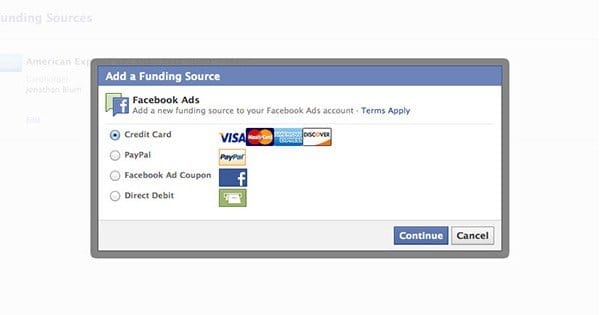
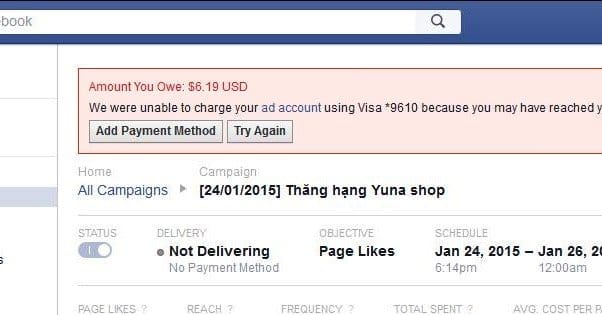
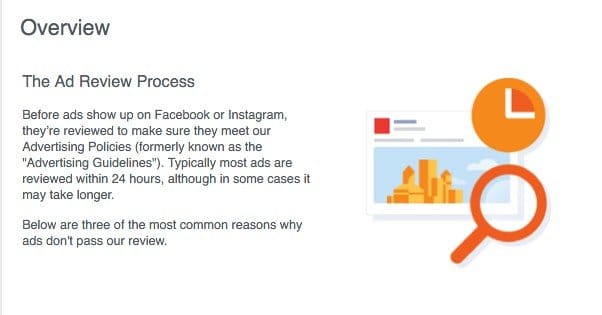
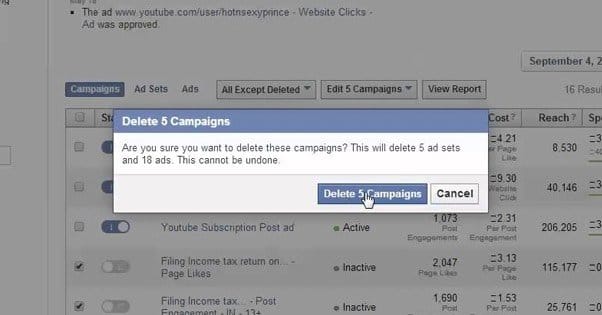
Well, if this is the case then you are relying too much on the Facebook ads. Reinvent your digital marketing strategy, try to focus on organic engagements, create groups, ask your friends and followers to share posts.